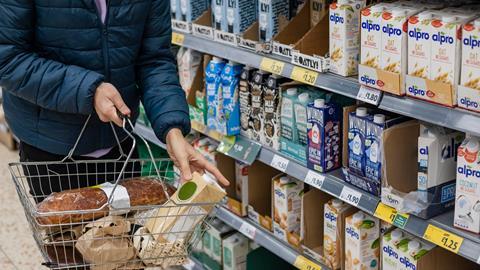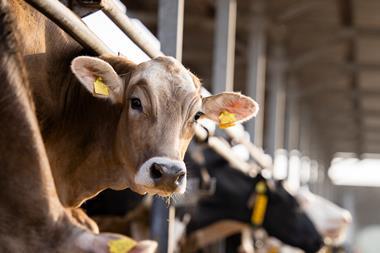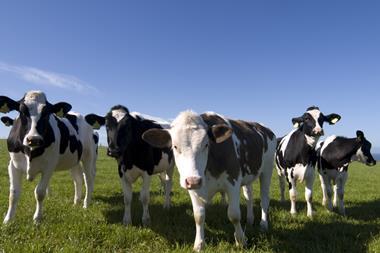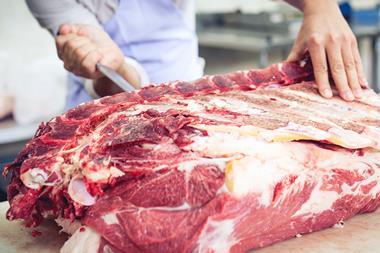“Oat and almond milk lack dairy nutrients”, screamed a headline in The Times yesterday, which asked “what is the healthiest milk?”
And people who switch to non-dairy options such as almond, oat and soya milk “are at risk of missing out” on the crucial benefits of nutrients including calcium, vitamin D and protein, the accompanying news story warned.
This is obviously not the first article to cast doubt on the nutritional benefits of plant-based dairy alternatives (or lack of) in recent years.
However, citing evidence from “the largest study to date of its kind”, this report revealed American scientists had examined 233 plant-based milk products available in the US, made by 23 brands. And they found just 12% of plant-based milk alternatives contained the same or higher levels of calcium, vitamin D and protein as cows milk.
The Times’ article – which drew on evidence presented at Nutrition, the annual conference held by the American Society for Nutrition – went on to state that almost three-quarters of the plant-based alt milks in the study had been fortified with extra calcium and vitamin D during the manufacturing process.
But despite this, “most still did not have the same levels as cows milk”, it pointed out.
So far, so concerning then… particularly when considering a passage in the same report, which referred to advice from the UK’s National Institute for Health & Care Excellence, warned vegan diets could put people at risk of vitamin B12 deficiency.
Not just plant-based coming under scrutiny
And this all came amid growing evidence shoppers were switching off from plant-based, with the report also citing Mintel research showing one in three Brits consume plant-based milk at least some of the time, compared with one in seven in 2018.
The problem, though, was the fact the same data compared plant-based dairy alternatives with US milk, which is generally fortified with vitamins, while – apart from a handful of exceptions – UK-sourced milk is not.
This all meant, despite the weight placed on the data at the top of the article, many of the arguments made in the piece had little bearing on the experiences of UK shoppers.
And it therefore had “limited relevance to the UK”, argued Marisa Heath, CEO of industry body Plant-Based Food Alliance, which added: “From a UK public health perspective, plant-based drinks are included in the government’s recommendations for a healthy diet and are included in the Eatwell Guide.”
But in the interests of balance, it’s not just plant-based products that are coming under the scrutiny of an often-skewed microscope, where different data sets are conflated to reinforce an argument.
A series of studies published over the past month have again raised questions over the impact of meat consumption on diets and the health of the planet.
One of which was a report published by the BBC last week citing an Oxford University study that claimed “having big UK meat-eaters cut some of it out of their diet would be like taking eight million cars off the road”.
The research showed that a big meat-eater’s diet produced an average of 10.24kg of planet-warming greenhouse gasses each day. A low meat-eater’s diet produced almost half that at 5.37kg per day. And for vegan diets, it halved again to 2.47kg a day, the report claimed.
Only livestock emissions were considered
But in response to the report, AHDB was one of many to state its “disappointment” in a study “conveying simplistic conclusions to a very complex topic”, which drew on global data to make an argument to UK consumers.
Red meat imports in 2022 came from fewer than 50 countries, so for the study to compare statistical averages taken from 119 countries seemed “irrelevant”, the levy board said, while stressing UK meat production was “among the most sustainable in the world”.
Meanwhile, Nick Allen, CEO of the British Meat Processors Association, added the report only looked at the emissions from livestock production. “It doesn’t take into account that carbon gets absorbed into the grassland, trees and hedgerows [on farms]. If they took those sums into account, you would probably have a different picture,’’ he said.
The report author countered by citing “a number of studies” that concluded the taking-up of CO2 by grasslands only has a “modest impact’’, including 2018 research by scientists Joseph Poore and Thomas Nemecek, which again drew on global data and has been the topic of much debate over its widespread use to beat the UK meat and dairy sector ever since.
Taken in isolation, there is of course merit in most of these scientific studies, which draw important conclusions on the impacts our diets are having on the health of both consumers and the planet itself.
But amid an increasingly febrile atmosphere, where there is growing evidence both diet and the climate are being dragged into a polarising culture war, this type of reporting – where a variety of data is conflated – also threatens to confuse people even more than they currently are.
And this could ultimately prove counterproductive if we are to coalesce behind a goal of reducing our impact on the planet.




















No comments yet